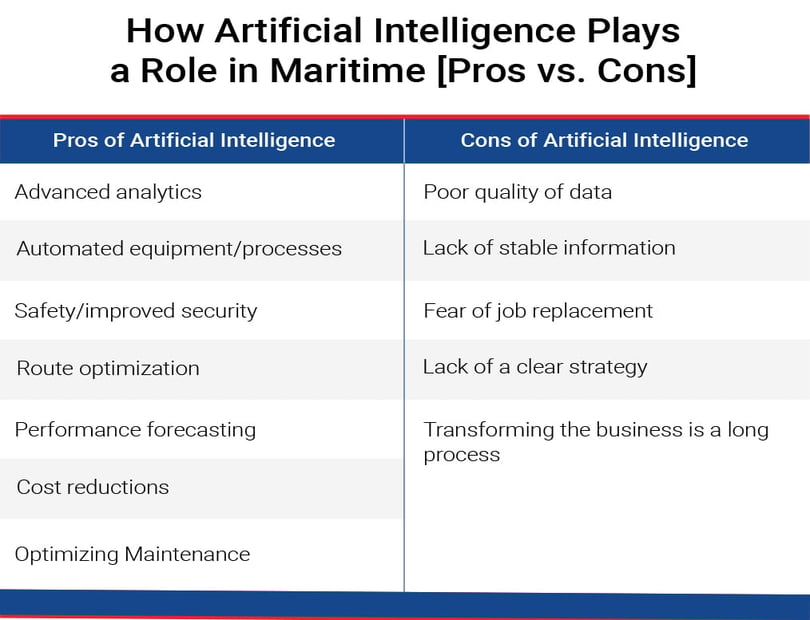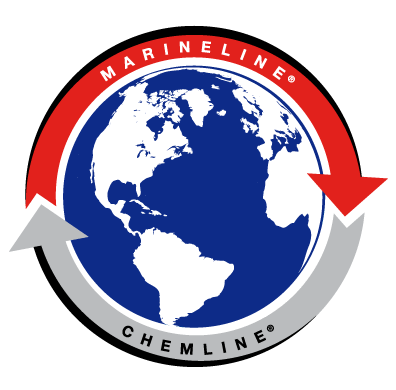Its uses are infinite, and artificial intelligence will continue to advance through new technology and innovation.
The benefits of leveraging technology in shipping have the power to impact your predictive capabilities and make your operations more efficient. Some implementations include real-time analytics, improved scheduling, automated processes, and more.
This article has everything you need to know about artificial intelligence in shipping. If you're looking for industry insights, barriers to AI adoption, or ways artificial intelligence will improve the shipping industry, you'll love this post.
Chapters
- 1Maritime Artificial Intelligence Industry Insights
- 2Barriers to Artificial Intelligence Implementation
- 3Advantages of Artificial Intelligence in Shipping for an Improved Future
- 4Implementing Digital Technology in Shipping - Use Cases
- 5How AI is Enhancing Safe Navigation
- 6The Future of Artificial Intelligence in the Shipping Industry
Chapter 1
Maritime Artificial Intelligence Industry Insights
Generally speaking, insights from a McKinsey Global AI Survey, the adoption of AI continues to increase, and the technology is generating returns. "The findings from the latest McKinsey Global Survey on the subject show a nearly 25 percent year-over-year increase in the use of AI in standard business processes, with a sizable jump from the past year in companies using AI across multiple areas of their business."
In addition,
A majority of executives whose companies have adopted AI report that it has provided an uptick in revenue in the business areas where it is used, and 44 percent say AI has reduced costs.
AI adoption is increasing in most industries, but capabilities vary. Logistics is beginning to become an AI-driven industry. With the use of AI, there is an excellent potential to improve the maritime industry through quality and speed by eliminating mundane and routine tasks.
A cross-industry earlier study on AI adoption by McKinsey found that early adopters with a proactive AI strategy in the transportation and logistics sector enjoyed profit margins higher than 5%.
Tarry Singh, a top artificial intelligent (AI) expert, when asked, "How is AI driving the economic growth of the maritime industry to its next stage of evolution?"
Commented,
"AI may be an opportunity that shippers should be looking at very seriously. Maritime operations have been extremely optimized, but there is definitely that “last nautical mile” efficiencies such as vessel precision operations using various geographical data to exactly make ETAs/ETDs, fine-tuning container routing, and re-routing, fuel-consumption models that offer “Fuel Savings Guarantees.”
He recommends for the industry to move forward by identifying patterns through Machine Learning, becoming aware of and accessing "big data," training your IT staff about Machine Learning, and more. You can read more on the article written by Kok Leong Lee, Maritime Fairtrade, AI Revolution: 6 Steps to Prepare Your Business.
Now for the opposition.
Wherever there is change, fear comes into play.
Chapter 2
Barriers to Artificial Intelligence Implementation
There are pros and cons to everything, and AI is no different. Despite the benefits, which we will discuss in the next section, the fear surrounding more intelligent solutions can often be a controversial topic.
Today, there are still barriers to the widespread adoption of AI, and not just in the maritime industry. Globally some challenges need to be addressed and overcome before moving forward and implementing AI.
In general, there are four key obstacles:
- Data integration
- Trust issues
- Time and energy limitations
- Shortage of talent on specific skills needed
Let's address a few of the challenges as they would pertain to the shipping industry.
1. Poor Quality of Data
As an industry, there is a need for shared data to make high-quality decisions. The industry must move past the idea of competitive challenges around data sharing to benefit all involved. The quality of data in the sector could slow down its adoption of artificial intelligence (AI) technologies.
The principal aim would be to improve decisions through the availability of data-driven insights.
2. Lack of “Solid Information”
Furthering the quality of data would be the lack of reliable information across the entire supply chain, which would also prevent its development. Analytic insights need sourcing from accurate data. Data-driven decisions are only as right as their insights.
Proper data collection and consistent data collection would be needed.
3. Fear of Job Replacement
There are concerns that computers and technology will have an impact on the type of jobs being created or replaced. The kind of work is likely to shift when AI is fully adopted.
Workers will need to spend time understanding and learning new technology in their workplace. The industry as a whole will need to keep pace with the innovations of artificial intelligence, the Internet of things, sensor technology, etc.
4. Transforming the Business Through Digitalization will be a Process
Digitalization transformation is a process. There will be time constraints, limitations, and development costs. The process will enhance ways of working smarter, simpler, and more efficient.
5. Lack of a Clear Strategy
Risks can be controlled when managing the process step-by-step. A clear strategy is a designed set of actions to create an advantage over competitors.
Colin Boyd, International Speaker, and Business Mentor shares his #1 tip for creating a clear strategy.
Colin Boyd, The #1 Tip for Creating a Clear Strategy, via YouTube
It is essential to have a clear and understandable strategy. Mastering clarity, goals, adaptability, and resources will enable companies to turn their strategy into success.
Chapter 3
Advantages of Artificial Intelligence in Shipping for an Improved Future
The technology of using data as a tool to learn from the past to help you improve decision-making in the future is invaluable. Some of the outstanding benefits of AI in the shipping industry include but are not limited to, improved analytics for decision-making, automation, safety, route optimization, and increased efficiencies.
1. Advanced analytics - Advanced analytics are used to make valuable business insights from many data sources. This will help ensure your decisions are based on data-proven methods.
2. Automated equipment - AI and automation play a role in the shipping industry. Machine learning capabilities will help in the analysis of historical data by considering such things as weather patterns or busy/slow shipping seasons. Automating processes can help identify problems before they happen. This allows time to make adjustments.
3. Safety and improved security - Accidents can be reduced using artificial intelligence. AI can also be used to detect threats and other malicious activities.
4. Route optimization - Route optimization would build optimization models to determine the most efficient route to take. With the help of AI, a prediction of the best path with minimum fuel consumption, and considering the weather can be calculated.
5. Performance forecasting - Performance forecasting could take the relationship between speed and power to predict changes in performance due to underwater fouling. You could use historical data to understand what is the rate of the degradation of the performance of the vessels.
Arundo offers software capabilities to connect real-time data to machine learning, analytical models, and simple interfaces for better decisions. In the video below, they discuss how AI can help with route optimization and performance forecasting.
AI usually refers to Machine Learning, where computers learn over time by applying algorithms that will improve with experience. For example, as stated above, AI in the shipping industry can be utilized to enhance shipping routes. AI can determine the best course at the best speed.
The power of data allows the shipping industry to forecast and optimize future performance and so much more.
Below we also highlighted a quick side-by-side comparison of the pros and cons in the shipping industry when it comes to AI. It is just the beginning.
More AI means more benefits. Bringing AI, analytics, and automation together will increase your ability to monetize your data and reduce risk.
Chapter 4
Implementing Digital Technology in Shipping - Use Cases
New technologies bring shifts in the way things are done. Below are just a few studies of AI in the works. It can cut down on fuel consumption, improve shipping operations, and enable sustainable societies with smart technologies. You can use AI in different areas of your business for better results.
1. Cut fuel consumption
Hitachi Europe Ltd., a subsidiary of Hitachi, Ltd., has partnered with Stena Line, one of the largest shipping companies in Europe. Their goal is to implement artificial intelligence technology on ships to reduce fuel consumption costs and become an essential tool in the company’s efforts to minimize environmental impact. [source]
2. Using AI to improve shipping network operations
Orient Overseas Container Line (OOCL) teamed up with Microsoft’s research arm in Asia to use AI to enhance shipping network operations. OOCL has a proud track record of adopting new technologies with real business impact. It has fully embraced a hybrid cloud infrastructure with auto-switching and auto-scaling throughout its business [source]
3. Enabling sustainable societies with smart technologies
Wärtsilä (a global leader in smart technologies for the marine and energy markets) is disrupting the industry by establishing an ecosystem that is digitally connected across the entire supply chain through applications that are secure, smart, and cloud-based. [source]
Chapter 5
How AI is Enhancing Safe Navigation
Effective AI is reliant on data. As the shipping industry develops better big data capabilities, the opportunity to build new systems that can help humans operate vessels more safely and efficiently is growing.
Ships are growing in size and number. And with the increase in growth comes the rise of potential collisions.
According to EMSA's (European Maritime Safety Agency) annual review, in the five years from 2014-2019, approximately 4000 collisions and incidents have been reported annually, with 75-96 percent of these marine incidents attributed to human error.
However,
Applications are being developed for shipowners and logistics providers. They include autonomous ships, voyage planning, and ship maintenance.
The shipping industry is just scratching the surface of what's possible when you bring shipping together with artificial intelligence.
International Maritime Organization (IMO)'s Strategic Plan (2018-2023) has a key Strategic Direction to...
"Integrate new and advancing technologies in the regulatory framework." This involves balancing the benefits derived from new and advancing technologies against safety and security concerns, the impact on the environment and international trade facilitation, the potential costs to the industry, and finally, their impact on personnel, both onboard and ashore. [source: IMO.org]
Autonomous and remote-controlled ships are being trialed in some sea areas. As the industry progresses, sensors will provide data with the help of radar, sonar, lidar, GPS, and AIS which will supply data for navigational use.
Maritime autonomous surface ships (MASS) are crewless vessels that transport containers or bulk cargo over navigable waters with little or no human interaction. Different methods and levels of autonomy can be achieved through monitoring and remote control from a nearby manned ship, an onshore control center, or through artificial intelligence and machine learning—letting the vessel itself decide the course of action. [source: Towards autonomous maritime operations]
Philip Nielsen, General Manager Europe, and Dor Raviv. CTO and co-founder at Orca AI give insights into how AI enhances navigational safety and saves human lives.
Watch the video with Orca AI . . .
Key Takeaways:
1. Existing navigation tools are not suitable for congested areas.
2. Safety challenges include low situational awareness, shortage of experienced crew, no practical onboard training, and shortage of valuable data.
3. AI solution benefits include safer operation, safeguarding yourself in the unlikely event of an accident, gain visibility and transparency between ship and shore.
In the next section, we explore how AI can identify risk in ports . . .
Detecting Risk in Ports
The Fujitsu Human Centric AI Zinrai solution uses artificial intelligence to identify the risk of vessel collisions in one of the world’s busiest ports. It delivers warnings in plenty of time for ships’ crews or traffic control officers to take evasive action, avoiding potentially-catastrophic collisions.
Watch how . . .
"Hotspot detection technology can detect risks up to 15 minutes in advance, giving staff even more time to react and prevent incidents."
Resources:
Thetius, What is big data and how will it affect the maritime industry?
Maritime Cyprus, EMSA Annual overview of marine casualties and incidents 2020
Allianz, Allianz Global Corporate & Specialty; Safety and shipping review 2020
Chapter 6
The Future of Artificial Intelligence in the Shipping Industry
Port Technology, How Artificial Intelligence (AI) Will Affect Ports and Terminals via YouTube
Dr. Yvo Saanen, Commercial Director and Founder of TBA cites:
"AI will be able to make the movement of port equipment such as automated guided vehicles (AGVs) and cranes more efficient as technology becomes “less sensitive” to disturbances due to AI removing the need for a continuous feed of instructions."
According to Nautic Expo, Global maritime freight transportation revenue is "estimated to reach US $205 billion by 2023, up from US $166 billion in 2017. To do this, the industry—logistics, ports, shipping, etc.—will need to add AI to its armory of digital technologies."
Conclusion
The potential of artificial intelligence is hard to ignore. The number of successful case studies and examples will continue to grow as we look toward the future, for the integration of AI in the shipping industry.
Artificial intelligence can deliver considerable benefits to the supply chain and shipping operations. Some advantages include reduced cost, less risk, improved forecasting, faster deliveries through more optimized routes, and more.
There will be a continued transformation of the shipping industry. Those who take action and start incorporating AI into their supply chains can build more efficient networks. This will, in turn, free resources for shippers to invest in their products, teams, and technology.
Digital change has its benefits for the port, supply chain, customer, and environment. The ability to move swiftly between various cargoes is also essential. Selecting the right coating extends the range of cargoes, reduces the time needed to switch them, and delivers the highest return on investment (ROI).
As a quality, premier coatings solutions provider, we provide innovative, value-added coatings for the protection of your assets.
Photo by chuttersnap on Unsplash

.png)






